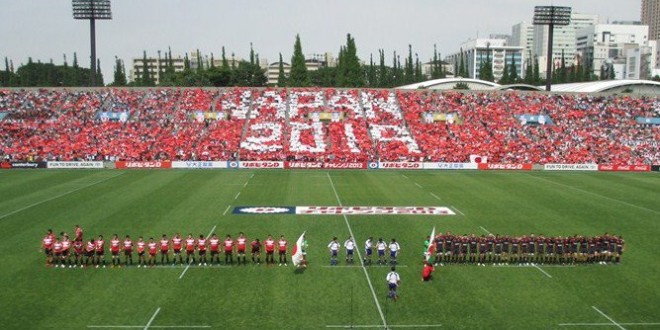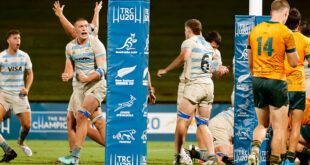Seeding for the twelve automatic qualified countries for Rugby World Cup 2019 is likely to be Pushed back 12 months, the Scotsman reported this morning.
Rugby’s global event will be staged outside of a founding union member for the first time in history when Japan hosts the Rugby World Cup in 2019. The twenty team event will see eight qualifying countries from throughout the world joining the twelve countries who finished in the top three of each pool at Rugby World Cup 2015 in England and Wales.
The prequalified countries are Argentina, Australia, England, France, Georgia, Ireland, Italy, New Zealand, Scotland, South Africa, Wales and hosts Japan. Of them all but Georgia and Japan were earned direct qualification for last year’s tournament.
The ranking system will see team’s placed into three bands of four according to their rankings at the time of the draw. Those ranked 1-4 will be Band A, 5-8 will be Band B and 9-12 will be Band 3. Those who failed to earn automatic qualification will be excluded even if they are ranked higher than an automatic qualifier as is the case at present with Fiji and Tonga who are both above Italy.
Seeding for the 2015 event was determined by the final positioning of the twelve prequalified countries from Rugby World Cup 2011 based on the World Rankings at the time of the draw, on December 03 2012. The date was widely criticized for it being far too early – close to three full years before the tournament itself.
With Wales having underperformed in November and December 2012 the Welsh found themselves ranked 9th in the world, thereby making it possible for the Pool of Death to be formed. The result was Wales were pooled with both Australia and England which significantly complicated the schedule itself with Cardiff being one of the venues.
One of the major benefactors of the draw for 2015 was Scotland who, at the time was not ranked in the Top 8. The luck of the draw saw Scotland joining Samoa rather than England. With South Africa, Japan and the USA completing the pool the Scots were given a more negotiable schedule than the Japanese who ultimately fell victim to a short turn-around between facing South Africa and Scotland.
By altering the seedings for the next Rugby World Cup such stated problems will not be fully rectified but the chances of repetition will be decreased. The short-term trends of a team’s individual ranking in the year following a Rugby World Cup will be balanced out by an additional year of international competition.
Changes to the personal in a particular senior roster will also enable a more reflective ranking than that of a team’s position twelve months prior. The building phase for the following Rugby World Cup will be fully underway for all prequalified countries in 2017 while 2016 will serve, for many, as a year of transition.
In December 2013 Wales was back in the Top 8 while Argentina had fallen to 10th in the world, thereby joining Scotland, Italy and Tonga as the four bottom ranked automatic qualifiers for Rugby World Cup 2015. Additional changes meant both England and Australia were in the Top 4, a fact which undermined the controversial early draw.
Whether or not it is December 2017 which determines the seeding remains unconfirmed. The Scotsman believes that it is to be finalised in the second or third quarter of 2017. The timing of such would be a balancing act between having it done as late as viably possible as organizers are concerned of selling tickets to matches at a time when Tokyo is also preparing to host the 2020 Olympic Games.
The Home unions of England, Ireland, Scotland and Wales in addition to New Zealand may all be disadvantaged due to the 2017 British and Irish Lions tour. While the three test matches are to carry test match status they will not count towards World Rankings.
Unconfirmed reports speculate that Scotland will play tests in Australia and Japan during the Lions tour. Similarly England will play in Argentina, Wales in Fiji and Samoa while Ireland are speculated to be playing in Canada and the USA. Losses for any could mean the difference between a team being ranked in Band 1, 2 or 3.
Fears had been expressed that the upcoming June international tours could hurt England, Ireland and Wales. They are to play three tests in Australia, South Africa and New Zealand respectively. France, meanwhile is to play in Argentina without players from the leading Top 14 clubs.
By putting off the draw until after either the mid-year or end of year international program in 2017 the prospects of any of the five above mentioned European nations being temporarily disadvantaged will thus be decreased but not resolved.
 Americas Rugby News Rugby news from across the Americas!
Americas Rugby News Rugby news from across the Americas!




